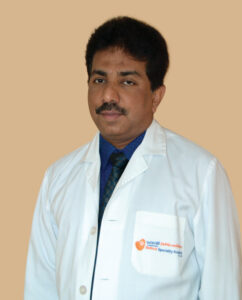How old is your Heart? What can we do to keep it Young?
 Dr. Sunil Roy T.N., MD, DM, FESC, FACC / Consultant Interventional Cardiologist / Belhoul Speciality Hospital
Dr. Sunil Roy T.N., MD, DM, FESC, FACC / Consultant Interventional Cardiologist / Belhoul Speciality Hospital
If your vascular age is greater than your chronological age, you may be at more risk of developing cardiovascular disease (CVD) later in life. If your real age is 45 and your vascular age is 55, your blood vessels are more like those of a healthy 55-year-old.
As a consequence, you are at a higher risk of developing CVD than that based on your age. Having a high heart age increases the risk of serious health issues including heart attack, stroke, chronic kidney disease and dementia.
Making simple changes, like doing more activity or quitting smoking, can reduce this risk and it is recommended to lower the heart age before it is too late.
What is Heart Age?
One of the cornerstones of the prevention of cardiovascular disease is the identification of individuals at higher risk of developing this condition. The absolute cardiovascular risk is a statistical and epidemiological concept that many patients may find difficult to understand. However, the concept of vascular age as the age of the arteries is a concept related to the risk that might be more easily understood by all.
The use of vascular age may thus help the physician to explain the risk status of the patient and therefore improve patient compliance with therapeutic decisions. This age is calculated as the age a person would be with the same calculated cardiovascular risk but whose risk factors were all within normal ranges. The Heart Age Test is really important as it gives an idea of heart attack and stroke risk.
Why is Heart Age Important?
Heart Age shows how many years people can expect to live healthily without a heart attack or stroke. Studies have shown that 1 in 10 men aged 50 taking Heart Age Test have a heart age at least ten years older than they are. Approximately 4 in 5 (79.2%) people over 30 have a heart age older than their chronological age, making them more likely to have a potentially fatal heart attack or stroke.
A significant proportion of the public is unaware of their own cardiovascular risk factors. 4 in 5 people (78.8%) did not know what their cholesterol levels, almost half (49.5%) did not know their blood pressure. Factors like high blood pressure and high cholesterol, as well as smoking, diet and a lack of exercise, can increase someone’s risk of developing CVD. Telling people their heart is older than it should be is shown to be a more effective way to get them to change behavior and improve cardiovascular health.
Knowing your heart age is vital to taking control of your health. Armed with this knowledge, you can start to make changes to help protect yourself against cruel and life-changing events such as heart attack and stroke.
The younger you start making small but significant changes, the greater the return on your investment in your health. Research has shown that high blood pressure, high cholesterol, smoking, poor diet and a lack of exercise all contribute to increasing your risk of developing cardiovascular disease. Many online tools are available at finding out your heart age, and I will recommend British Heart Foundation website (https:bhf.org.uk) or NHS website (https: nhs.uk) for the same. Why not take action and make the first steps to improve the health of your heart by logging on and using this simple and quick heart age online tool. Even though you may not have symptoms, having a heart age higher than your own age indicates an increased risk of developing serious illness in future.
CVD risk factors (BOX 1)
- The main risk factors for CVD are:
- high blood pressure
- smoking
- high cholesterol
- diabetes
- inactivity
- being overweight or obese
- the family history of CVD
- ethnic background
- other risk factors
- age: CVD is most common in people over 50 and your risk of developing it increases as you get older
- gender: men are more likely to develop CVD at an earlier age than women
- diet: an unhealthy diet can lead to high cholesterol and high blood pressure
- alcohol: excessive alcohol consumption can also increase your cholesterol and blood pressure levels, and contribute to weight gain
How Can Heart Age be determined?
Your arteries age more slowly when nurtured with daily exercise, a healthful diet, and good relationships with family and friends. They age faster when they are constantly assaulted by cigarette smoke, foods laden with saturated and trans fats, chronic stress, and other traumas. Data accumulated in the Framingham Heart Study has helped researchers create a general cardiovascular risk profile. Similarly, the SCORE system developed by European Society of Cardiology has been used to develop a scoring system to calculate the cardiac risk. With answers to a few questions in Box 2, the online tools can estimate your vascular age which is easiest and cheap method to find out your Heart Age. The Heart Age Tool gives an immediate indication of a person’s potential risk and what they can start doing to reduce the risk.
Each heartbeat sends a wave of blood through the body’s network of arteries. Measuring the speed of the pulse wave provides information about how stiff or flexible the arteries are. The speed of the wave can be used to calculate the vascular age by some special devices. The innermost layer of an artery’s wall is called the intima; it provides a smooth surface for blood to flow through.
The thicker the intima and the media, the more likely the artery is choked with a cholesterol-filled atherosclerotic plaque. Using ultrasound, a doctor can easily measure the intima-media thickness in the carotid arteries in the neck. This measurement can be also used to estimate vascular age. With the use of cardiac CT scan we can found out the level of calcium in heart arteries, and we can use this information to find out the Heart Age from this value as well. Since most insurance companies don’t pay for these tests, and not very widely available, the online tool to estimate the Heart Age is a good place to start unless you don’t mind paying the extra bill for this information.
The Heart Age Calculator will ask you questions about (BOX 2)
- Your age and gender.
- Your ethnicity and where you live
- Your health status including heart health, diabetes and kidney disease.
- Smoking status.
- Your weight and height (to work out your BMI or body mass index)
- Family history.
- Cholesterol and blood pressure levels.
What can we do to prevent Heart from aging?
Heart health depends on things like blood pressure, cholesterol, blood sugar, body mass index (BMI), and waist circumference. Your Heart Age is likely to be more if your body mass index (BMI) is 25 or above, a waist measurement of 94 cm (about 37 inches) or more, (woman 80 cm (about 31.5 inches) or more). CVD prevention guidelines advise at least 150 minutes of moderate aerobic activity a week such as cycling or brisk walking, to decrease your risk of cardiovascular diseases. Excess dietary salt is one of the biggest risk factors for high blood pressure and one that can be easily modified. A balanced diet has been proven to improve heart health. Another modifiable factor is cholesterol. It can be reduced by reducing the amount of saturated fat in your diet, eating foods that contain unsaturated fat, eating plenty of high fiber foods. Smoking is the single most significant factor in increasing a person’s risk of cardiovascular disease and quitting smoking is the single best thing you can do for your heart health. Being educated on your numbers like blood pressure, BMI, Waist measurement, blood sugar and cholesterol levels and using this information to know your risk and understanding what they mean is the first step to leading a healthy life. Ten lifestyle interventions for keeping the Heart Age young are given in Box 3.
Lifestyle changes to keep Heart Young (BOX 3)
- Get more physically active.
- Tackle obesity.
- Check your blood pressure and keep it normal.
- Lower salt consumption.
- Improve your diet.
- Lower cholesterol.
- Stop smoking.
- De-stress.
- Drink less alcohol.
- Fresh air.
















